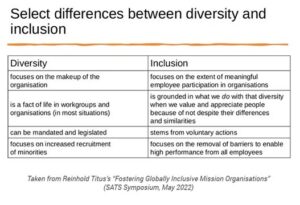Inclusion is a hot topic at the moment in many corporate environments, but it is also a concept being examined in global mission organizations.
Why is it so important? Why is it at the forefront of many people’s minds and the topic of much discussion? Because pursuing it is a need that resonates with many, even if they aren’t able to put that need into words; and because it is a Biblical concept (more on this later).
Reinhold Titus, Chief Strategy and Inclusion Officer at OM Ships, recently presented a SATS symposium titled “Fostering Inclusive Global Mission Organisations” where he did a fantastic job of summarizing his Master’s research on this issue.
While many are aware of what “diversity” means, diversity and inclusion are not the same thing.
To paraphrase Reinhold, diversity refers to the visible and invisible differences in race, nationality, gender, culture, theology, generation, religion, language, cognition, and educational background. Inclusion, on the other hand, is harder to pin down and requires a deep understanding of both conscious and unconscious practices that create barriers—in order to remove those barriers.
I found the table that Reinhold shared during his symposium a helpful illustration of the differences between the two in the context of an organization:

Although inclusion doesn’t mean a blanket “anything goes,” the fact that inclusion is a Biblical concept highlights how important it is to God:
- God, Jesus, and the Holy Spirit themselves form a trinity: three as one. During his prayer in John 17, Jesus says to God, “I pray that they will all be one, just as you and I are one—as you are in me, Father, and I am in you.” (John 17:21 NLT)
- God created both day and night; heaven and earth; the sun and the moon—all seeming opposites, but intended to function together as parts of a greater whole. (Gen 1)
- 1 Cor 12 speaks about how we are all parts of the body of Christ.
- Rev 5:9 and Rev 7:9 describe the church as it’s meant to be: global and multi-cultural, with every tribe, language, people, and nation represented.
So how do we take a step towards inclusion and fostering it? I believe it starts with an act of love: listening. As Dallas Willard said, “The first act of love is always the giving of attention.”
We really do struggle to listen. Sometimes, it’s because we want to share our own story or give advice, and neither of those desires is necessarily bad; but if we give in to them when what is called for is openness and humility, then we’ve skipped ahead past the listening part, past the attitude of receptiveness. At other times, we are uncomfortable with uncomfortable and want everything to be okay. And often, we’re simply distracted.
But since we center the way we live on Christ, let’s consider how he lived:
- His exchange with the Samaritan woman at the well is the longest recorded conversation between Jesus and another person. (John 4)
- When a synagogue leader pleaded with Jesus to heal his daughter, Jesus went with him. (Mark 5)
- When Jesus saw a large crowd arguing and they approached him, he asked them what they were arguing about. (Mark 9)
- Jesus had dinner with not only his disciples, but also tax collectors and sinners, and when he heard people asking why, he explained. (Matt 9)
- Before Jesus healed the man at the pool, he first asked him, “Do you want to get well?” (John 5:6)
Jesus listened; Jesus engaged.
Inclusion can be an emotive topic, and I have felt convicted and challenged in this area myself; but a pastor’s sermon on listening days before I watched Reinhold’s symposium prepared my heart to receive the important message he had to share. And it started with paying attention to all the little moments when Jesus took the time to stop and listen to people.
As we learn to better embody God’s unified vision for the church, let’s develop our listening skills, maintaining a Christ-centered approach while engaging with the world.
- I encourage you to watch Reinhold’s symposium (found here). I believe his blend of deep understanding and a logical flow makes the topic accessible and helpful to all.
- If you are interested in either the research already performed in this area, or delving deeper into this topic yourself, don’t hesitate to contact SATS (here).
Short Bio: Carrie Milton is a veterinarian and language practitioner. After completing her Bachelor of Veterinary Science and working with a variety of animals for a number of years, she reawakened her love for the written word. Accredited by the Professional Editors’ Guild, she has tried her hand at everything from theses to fiction




